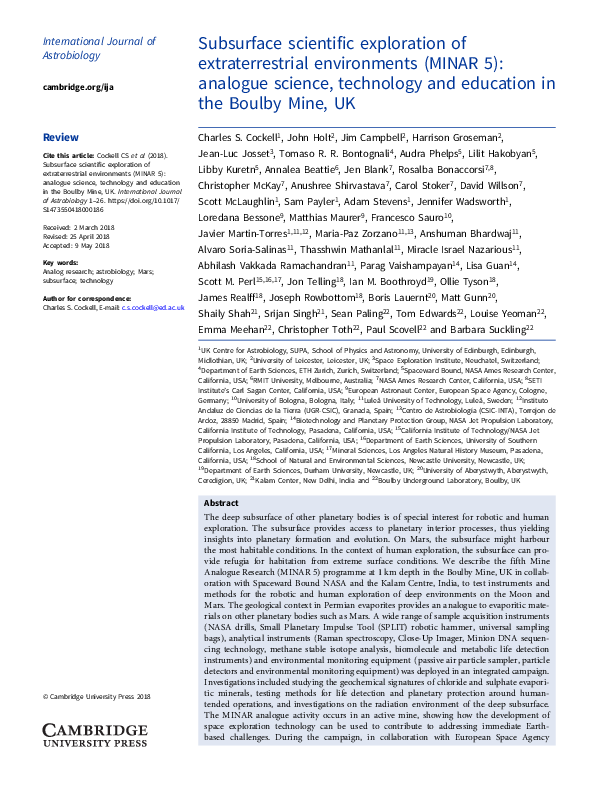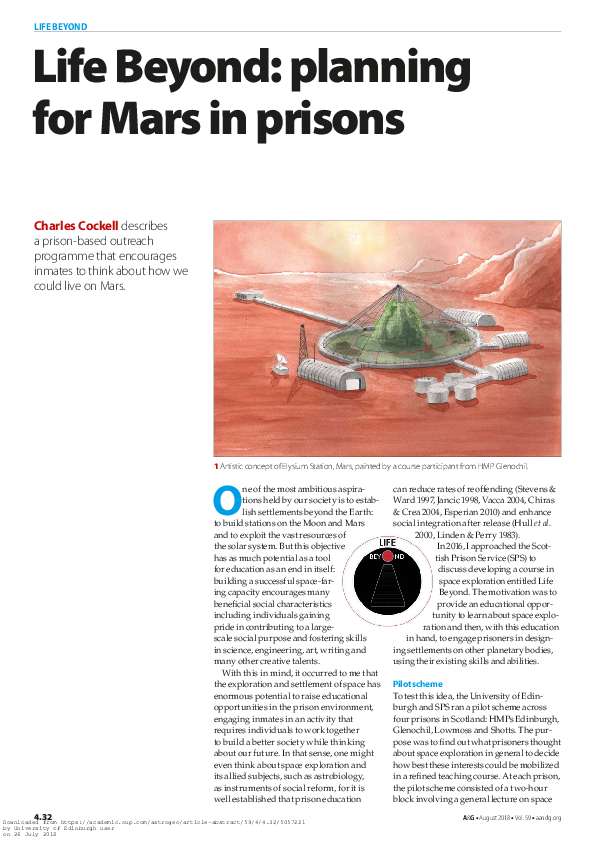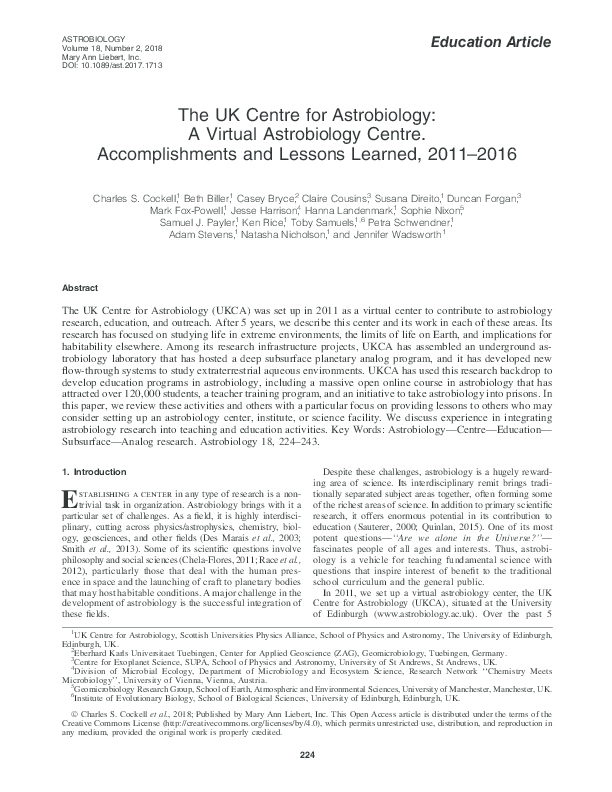News
Here you can find the latest news from the UK Centre for Astrobiology.
Students explore new depths in astrobiology
December 2024
Students enrolled on the MSc degree in Astrobiology and Planetary Sciences have literally deepened their knowledge by descending a kilometre underground to explore life in extreme environments.
In December 2024, the students travelled to Boulby Mine, the location of the world's first subsurface astrobiology lab, established by the University of Edinburgh’s UK Centre for Astrobiology (UKCA) in 2013.
The mission to the subsurface began with lectures on using mine facilities as analogues for extraterrestrial environments. The students then completed health and safety training and donned protective gear for the expedition underground.
Inside the mine, students practised sterile sampling methods and investigated salt mineral deposits similar to those found on Mars. They learned about geothermal heat, ionizing radiation, geology, and subsurface microbiology. A highlight was touring a Science and Technology Facilities Council (STFC) laboratory including dark matter and neutrino detectors.
Salma Malaika, MSc Astrobiology and Planetary Sciences student said:
From just a few hours underground, I was able to gain an intuitive feel for what it means to be a researcher in an isolated world, and to truly see the beauty and intricacy behind conducting research in a challenging environment. My passion for the field—and admiration for researchers and staff—has only grown.
Andrew Wright, MSc Astrobiology and Planetary Sciences student commented:
Surrounded by halite crystals, 1000 meters below the surface, few things can compare. Being able to witness the frontier of dark matter and astrobiology research in person was astounding! It was like experiencing another world on Earth and was an experience I’ll never forget.
The immersive activity was part of MINAR (Mine Analog Research) which brings scientists and technologists together to use the Boulby underground laboratory to conduct science and test equipment in support of space exploration. This visit was made possible by the kind support of the STFC and ICL Boulby.
Funding success expands Planetary Palaeobiology Group
November 2024
UKCA co-director Sean McMahon has received two major grants, which will enable new lines of research and fund the recruitment of two new postdoctoral research assistants and a PhD student in the UKCA’s Planetary Palaeobiology Group (PPG). Taken together, the grants will bring nearly £1 million in new research funding to Edinburgh. The successful proposals concern fundamental questions about microbial palaeontology and the search for life in the universe.
The first project has been funded by the Natural Environment Research Council, part of UK Research and Innovation, as part of their “Pushing the Frontiers” programme. This project, “The Hidden Majority: Reading and Writing the Fossil Record of Bacteria”, will use sophisticated analytical methods and novel experimental protocols to discover how microorganisms have fossilized throughout Earth history, with implications for the search for life on Mars. McMahon is Project Lead and Prof Bryne Ngwenya, head of the School of GeoSciences, is Co-Lead. An advertisement for a related postdoctoral position will be circulated in the near future.
The second project, “Unambiguous Biosignatures for Life Detection”, has been awarded $1.2 million US by the International Human Frontiers Science Program Organization (HFSP), to be split between three investigators. The Principal Investigator is Henderson Cleaves (Howard University, USA). Sean McMahon and Mark van Zuilen (Naturalis Biodiversity Centre) are Co-Investigators. This project will use a “big data”, algorithmic approach to identify what is distinctive about living systems in quantitative terms. While helping to discover what makes life “special”, the new research will also provide fundamental methods for defining and detecting life in the universe. The project will begin in December 2024 with the appointment a new postdoctoral research assistant (Niall Rodgers) and a PhD student (Beilei Hua). Niall Rodgers holds a PhD in mathematics from the University of Birmingham, while Beilei Hua completed the UKCA’s MSc in Astrobiology and Planetary Sciences in 2024 and conducted her MSc dissertation research in the PPG.
PhD student nominated for the Vox Awards 2024
October 2024
Mia Frothingham, PhD student in the Planetary Palaeobiology Group at the UKCA, dedicated amateur science communicator, and volunteer with SpaceTV, was nominated for the prestigious Vox Awards 2024 in the category Best Human Performance in E-Learning/Medical Narration. Mia’s nominated work, “New Method for Finding Worlds Outside Our Solar System”, produced by SpaceTV, showcases her talent for making complex astronomical topics engaging and accessible. Congratulations, Mia!
Students aim for a high score with video game collaboration
August 2024
Students on the MSc degree in Astrobiology and Planetary Sciences have been sharing their knowledge and understanding about life on other planets with a video games company.
Auroch Digital, an independent game development company based in Bristol, is creating the video game ‘Mars Horizon 2: The Search for Life’, whose players will run a space agency, investigate the solar system and collect evidence of life.
The collaboration, which also involved astrobiology staff, included a number of online meetings and a visit from game developers to the University. Students carried out research and made scientific suggestions to inform in-game scenarios.
A tour of lab facilities conducted during the visit involved a demonstration of chemical reactions, the viewing of samples including rocks, minerals, organisms and fossils, and a guide to the ‘Mars chamber’, which reproduces the pressure, temperature and atmospheric composition of Mars to see how various materials and processes behave under those conditions.
Students on the interdisciplinary MSc degree in Astrobiology and Planetary Sciences work to understand the nature of life and whether we might find it elsewhere in the universe. They build on their knowledge of physics, chemistry, biology and geosciences to answer fundamental questions about living matter, how it forms, varies and evolves in concert with planets and stars, and how it is distributed across time and space.
An estimated 3.2 billion people worldwide play video games, making this one of the most popular forms of entertainment. With the steady rise in popularity of gaming over the past few years, there may be further opportunities for collaboration with scientists.
Madeleine Landell, a student on the MSc Astrobiology and Planetary Sciences degree commented:
Collaborating with Auroch on Mars Horizon 2 has been an incredible opportunity. It has both given us astrobiology students a glimpse into the creative and meticulously researched process that goes into videogame development, as well as allowing us to think differently about advances in space science. The Auroch team's dedication to preserving as much real science as possible in the video game was really impressive. They weren't afraid to get into the semantics of molecular biology and geochemistry in their pursuit of a scientifically accurate yet exciting game. We've left this collaboration with renewed excitement about how our current astrobiological research could contribute to the future of space exploration. We really look forward to the release of Mars Horizon 2.
John O’Donnell, Lead Game Designer on Mars Horizon 2 said:
We had so much fun collaborating with the students of the MSc programme. It was a privilege to see and hear about their work and have their influence on the game’s vision and authenticity. The students helped us research many what-if scenarios of life in our solar system and because of their diverse backgrounds this took the game in interesting new directions.
UKCA fellow scores RSE grant for understanding cold-tolerant bacteria
July 2024
Congratulations to Dr Stewart Gault who has received a Royal Society of Edinburgh grant to support his research in understanding how bacteria survive at low temperatures. The Small Research Grant from the Royal Society of Edinburgh (RSE) covers the costs arising from a defined research project and encourages high-quality research and academic innovation.
One of the major goals in astrobiology is discerning the limits to life and how life has adapted to extreme environments, thereby informing us as to whether extreme environments found beyond Earth are potentially capable of supporting life. Understanding the habitability of subzero temperature environments is particularly important as the icy moons Europa and Enceladus contain vast quantities of liquid water. However, we do not know what the low temperature limit for life is, or whether it is set by one factor or a combination of factors.
The current record holder for low temperature growth and metabolism is Planococcus halocryophilus (P. halocryophilus), which can replicate at -15°C, while maintaining metabolic activity down to -25°C. The mechanisms which facilitate this low temperature activity are currently unknown. This RSE Grant will enable Dr Gault to investigate whether it is the onset of intracellular vitrification that enforces a limit for P. halocryophilus’ low temperature activity and whether P. halocryophilus has adaptations which can modulate its intracellular vitrification.
In addition, he will be exploring whether the presence of extracellular ions found in the natural environment and the growth medium confer any depression of P. halocryophilus’ intracellular vitrification, thereby permitting low temperature metabolic activity without the need for specific vitrification oriented adaptions.
Postdoctoral fellow success for PhD student
April 2024
Congratulations to UKCA PhD student Annemiek Waajen who has been selected as a Schmidt Science Fellow.
PhD student Annemiek Waajenhas been selected as one of the 32 researchers in this year’s cohort of Schmidt Science Fellows.
This prestigious postdoctoral program harnesses an interdisciplinary approach as a way to break down silos among scientific fields in order to solve the world’s biggest challenges and support future leaders in STEM. The 2024 fellows consist of 17 nationalities across North America, Europe, and Asia.
Annemiek’s postdoctoral research will focus on permafrost thawing and its impact on climate change.
The increasing temperatures in the Arctic, resulting from climate change, will lead to the thawing of currently frozen (permafrost) soils, soils that store large amounts of carbon. To what extent this will contribute to climate change is not well understood due to research limitations.
As a 2024 Schmidt Science Fellow, Annemiek plans to build a holistic perspective on permafrost thawing, comparing single-site and single-method studies in a global, multi-omics meta-analysis. This insight will help address this issue and support policymakers in limiting its impact.
The Schmidt Science Fellows program provides the world’s best emerging scientists with new skills and perspectives to develop novel solutions to society’s challenges, become scientific and societal thought leaders, and accelerate ground-breaking discoveries.
Each Fellow will undertake a year-long Science Leadership Program to develop the skills, experience and networks necessary to become the next generation of interdisciplinary science leaders alongside a one- to two-year research placement at an internationally-renowned lab.
Schmidt Science Fellows is an initiative of Schmidt Sciences, delivered in partnership with the Rhodes Trust.
Start of the new MSc in Astrobiology and Planetary Sciences
September 2023
We are excited and pleased to welcome the students of the first year of the MSc Astrobiology and Planetary Sciences at the University of Edinburgh.
On this programme they will develop critical thinking about astrobiology and planetary science in their social contexts, research methods and how different scientific approaches address fundamental questions about life in the universe.
Astrobiology and Planetary Sciences MSc | The University of Edinburgh
The Tartan Tardigrade podcast is back
September 2023
UKCA student Mia Frothingham speaks to PhD candidate Caprice Phillips from The Ohio State University.
The Tartan Tardigrade - Episode 11: Caprice Phillips
UKCA members participate to ASB9
September 2023
Wide representation of the UKCA at the 9th Astrobiology Society of Britain conference.
The conference celebrates the first 20 years of the Astrobiology Society of Britain. Among the keynote speakers, the organising commission invited Rosa Santomartino from UKCA.
UKCA welcomes new Senior Astrobiology Technician Nim Felton to Edinburgh
August 2023
We are pleased to welcome Miss Nim Felton to the UKCA.
Nim Felton joined the UKCA this week as our new Senior Astrobiology Technician. Nim joined us from the Edge Hill University, were she worked as a biology technician, and has a deep fascination with Astrobiology and extremophilic life.
New UK Centre for Astrobiology logo

August 2023
We are pleased to announce our new UK Centre for Astrobiology logo, developed to celebrate our first 10 years of research and science activities in the astrobiology and space biology field!
The new logo, designed by Dr Sean McMahon, reinterprets the three-colour motif of the former one by adding further details and improving its graphics. Colours of the logo summarises the main objects of interests in astrobiology and space biology: blue represents Earth and space, red represents Mars as a prominent example of the whole spectrum of extraterrestrial planetary bodies, green indicates life and biology.
UKCA strengthens link with Carl Sagan Institute at Cornell through Joint Research and Education Seed Grant
June 2023
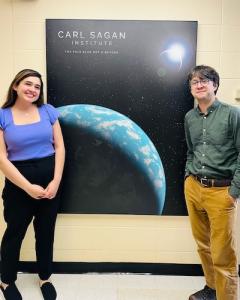
UKCA co-director Sean McMahon and MScR student in Palaeontology and Geobiology Mia Belle Frothingham travelled to Ithaca, NY between 3-8 June 2023 to pursue a new collaboration between the Carl Sagan Institute at Cornell (CSI) and the UKCA, two of the world’s leading hubs for astrobiological research. The collaboration is funded by the Global Cornell Joint Research and Education Seed Grant.
PI Lisa Kaltenegger at Cornell has previously pioneered using hemispherical reflectance measurements to catalogue the colours of organisms as comparisons for the biosignatures that may be resolvable on exoplanets. PI McMahon at Edinburgh has led the study of false biosignatures and how we can accurately identify non-biological processes mimicking the evidence of life.
In this new collaboration, we are testing the novel hypothesis that combinations of minerals, organic matter, and atmospheric conditions may lead to false biosignatures in exoplanet reflectance spectra obtained by next-generation telescopes. We anticipate crucial publishable results that will pave the way for significant further collaboration between the CSI and the UKCA.
Dr Corentin Loron is awarded a Leverhulme Early Career Research Fellowship
May 2023
Congratulations to Dr Corentin Loron, member of the Planetary Paleobiology Group of UKCA, for winning a competitive Leverhulme Early Career Fellowship. Starting from February 2024, Dr Loron will work on his own research project, aiming to identify fossil life on Mars using spectroscopy and machine-learning.
2022-2023 University of Edinburgh Changemaker Award
April 2023
UKCA co-director Rosa Santomartino, together with colleagues Patricia Gonzalez, Tracy Scott and Neil Corsie, has been awarded for her commitment to establishing the JCMB Biolab Sustainability group. The group has the aim to reduce the environmental impact of research practices by appropriate laboratory waste disposal and recycling, reducing single-use plastics, and implementing energy-saving initiatives.
Have a look at all the excellent people and groups awarded this year: 2022-23 Changemaker Award recipients | The University of Edinburgh
Youtube interview: Early Earth Microbes May Have Eaten Raw Meteorites.
April 2023
Annemiek Waajen and Rebecca Prescott from the UKCA have been interviewed by the YouTube channel “SciShow Space” about their research on microbes and meteorites. The channel made an episode on how microbes may have eaten meteorites on Early Earth, a research project we are currently working on at the UKCA.
Have a look at the episode to find out more: https://www.youtube.com/watch?v=BexmYmcW-Hs
UKCA research features on BBC's The Sky at Night
April 2023
UKCA co-director Sean McMahon and MScR student Mia Frothingham were featured on the BBC's flagship astronomy programme, The Sky at Night. The episode was entitled, "The Search for Alien Life" and broadcast on the 10th of April. UK TV license-holders can watch the episode here: https://www.bbc.co.uk/iplayer/episode/m001kytj/the-sky-at-night-the-search-for-alien-life.
UKCA research features on BBC Radio 4 Inside Science programme
March 2023
UKCA co-director Rosa Santomartino was featured on episode the BBC Radio 4 Inside Science programme. In this episode, Dr Santomartino discussed how microorganisms could support space exploration in a sustainable way, and how this could enhance our capacity to tackle environmental issues on Earth:
BBC Radio 4 - BBC Inside Science, Covid – missing link found?
UKCA welcomes new postdoctoral fellow Pamela Knoll to Edinburgh
January 2023
We are pleased to welcome Dr Pamela Knoll to the UKCA for two years.
Pamela Knoll joined the UKCA this week on a Human Frontiers Science Program Postdoctoral Fellowship. Pamela is a physical chemist with a PhD from Florida State University and postdoctoral experience at the Université Libre de Bruxelles and the Spanish National Research Council (CSIC) in Granada, where she held a Fulbright Award. Her interests focus on nonlinear dynamics, self-organization in inorganic materials, and biomineralization. In Edinburgh, her research will explore biomineral selection by extremophilic microorganisms.
UKCA launches new MSc programme in Astrobiology and Planetary Sciences
December 2022
- Video: MSc Astrobiology and Planetary Sciences
- MSc Astrobiology and Planetary Sciences
The UK Centre for Astrobiology (UKCA) in the University of Edinburgh's School of Physics & Astronomy is launching a new MSc in Astrobiology and Planetary Sciences. The MSc in Astrobiology and Planetary Sciences is the UK’s first Masters in astrobiology. The programme builds on Edinburgh’s substantial and leading role in astrobiology, geobiology and planetary sciences, including cometary studies and exoplanet science. Students will be fully embedded in the UKCA.
Click here to apply for applications for September 2023 entry.
Information on funded Scholarships is coming soon.
It’s an incredibly exciting time to be working in these fields and we very much look forward to welcoming the next generation of astrobiologists and planetary scientists to Edinburgh to participate in our programme.
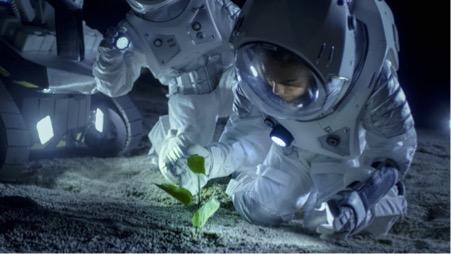
Astrobiology and the planetary sciences are interdisciplinary subjects that build on physics, chemistry, biology and geosciences to answer fundamental questions. Astrobiologists seek to understand life in an astronomical context: how it forms, varies and evolves in concert with planets and stars, and how it is distributed across time and space. Planetary scientists investigate the origin, diversity and behaviour of planets, moons, rings, asteroids, comets, and solar systems. Together, these sciences offer a distinctive and mind-expanding perspective on our own place in the universe.
The MSc programme will provide graduates with an exciting foundation in the rapidly advancing interdisciplinary science of life in the universe while offering methodological training for further technical or academic work in the planetary, life, or space sciences.
The key features of the programme are:
- Full-time programme, 12 months
- Taught components in astrobiology (theory and methods), planetary sciences, and a range of optional courses from environmental geochemistry to space law
- A research dissertation
Click here for more information.
New popular science book: Taxi From Another Planet
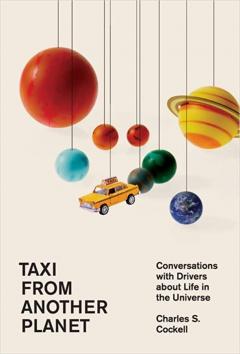
UKCA co-director Charles Cockell has published a new popular science book with Harvard University Press. "Taxi from Another Planet" is designed to make the cosmos accessible to any reader on Earth.
We all know cabbies like to talk - and when Charles Cockell is in the back seat, topics like the potential for alien life and the benefits of space exploration often come up. Each essay in this convivial collection takes questions like, Will we understand aliens?, What if there isn't life out in the Universe?, and Why is the government spending tax dollars on space programs anyway? as a jumping-off point for discussion. Taxi from Another Planet is available now. Get your copy here on Amazon.
UKCA welcomes new Fellow - Ziyao Fang to Edinburgh
We are pleased to welcome Ziyao Fang to the UKCA for two years.
Ziyao did his PhD in geochemistry in the University of Science and Technology of China. His interests are in planetary surface processes, the coevolution of life and planets, and isotopic and biomarker signatures of life. He has worked in the Qaidam Basin in Tibet among other places to study the signatures of life in evaporites. At Edinburgh, he will be carrying out a fellowship studying the distribution and nature of isotopic signatures in different sulfate deposits.
UKCA session at Oxford for Romania Summer School
August 2022
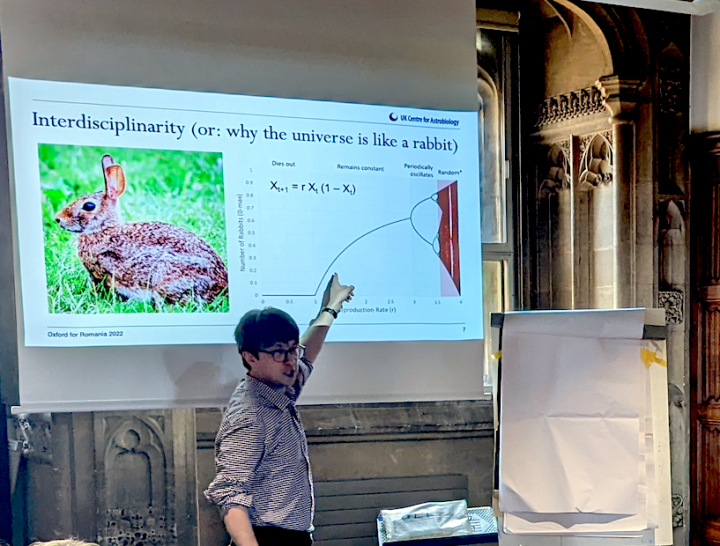
Every year the Oxford for Romania charity runs a Summer School in Oxford providing an eye-opening learning experience for high school students in Romania with great academic potential and limited financial means. This year, UKCA co-director Dr Sean McMahon travelled to Magdalen College, Oxford to lead a session on astrobiology and discuss academic career pathways with the students.
Students were introduced to core astrobiological concepts including habitability and biosignatures and solved a practical exercise on the temperature profile of Mars before conducting a debate on Mars colonisation. Feedback from the students included: "I never heard of astrobiology before and Sean’s course was captivating, interesting and funny," and "I seriously consider I could do something like this moving forward".
UKCA hosts workshop on self-organisation and abiotic formation of 'life-like' structures
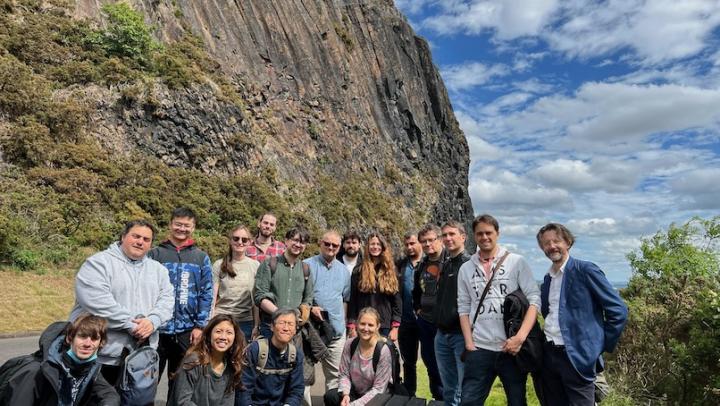
The UKCA is hosting a workshop (June 6th to 10th 2022) on abiotic self-organization and pattern formation in rocks, minerals, and other geological materials (including chemobrionic self-organization or “chemical gardens”).
The meeting is funded by the EU COST Action Chemobrionics (https://www.chemobrionics.eu/) and will bring about 30 scientists to Edinburgh from around the world. This meeting will inform future studies of how life can be distinguished from the complex products of “life-like” abiotic self-organization, helping us avoid mistakes in the recognition of extraterrestrial biology. We will share evidence, theoretical developments, practical advice/protocols, and demonstrations on two questions:
(1) which geological phenomena (mineral formations, diagenetic phenomena, pseudofossils, etc.) can be elucidated by investigating them as instances of self-organization, i.e., spontaneous pattern-formation driven by the internal dynamics of nonequilibrium systems? (Established examples in geoscience include Liesegang rings, agate banding, manganese dendrites and basalt columns);
(2) how do specific experimental, numerical, and analytical methods help us to understand these phenomena?
Fellowship Successes: Space Microbiology and Early Life
Spring 2022
We welcome and congratulate two postdoctoral staff members beginning highly prestigious and competitive Leverhulme and Royal Society research fellowships at the UK Centre for Astrobiology.
Dr Rosa Santomartino, previously a postdoctoral scientist working with Prof Charles Cockell, has been awarded an Early Career Fellowship by the Leverhulme Trust.
Dr Corentin Loron, who recently completed a doctorate in palaeobiology at the University of Liège, joins the Planetary Palaeobiology Group at the UKCA as a Newton Fellow supported by the Royal Society.
Dr Santomartino's research in space microbiology focuses on the molecular mechanisms that drive microbial interaction with natural and artificial environments in space, to perform space biomanufacturing, recycling and in-situ resource utilisation (ISRU), and to promote an efficient and sustainable impact of space exploration and its terrestrial applications. She performed two microbiology experiments onboard the International Space Station, BioRock and BioAsteroid, launched in space in 2019 and 2020 respectively. She is an invited scientific advisor in microbiology for the Italian Space Agency, and collaborated with international scientists in the creation of the NASA Decadal Survey on microbiology.
Dr Loron's research focuses on the use of state-of-the-art microanalytical techniques to investigate the fossil record of early life on Earth, with implications for the tempo of major evolutionary events and the search for life on Mars and beyond. His previous achievements include discovering a new species of organic-walled microfossil that may represent the oldest known fossil fungus, a diagnosis supported by infrared spectroscopy and scanning electron microscopy. His work at the UKCA will focus on the development of new experimental and analytical tools for interrogating very ancient organic materials, and on further resolving the evolutionary history of major groups of life on Earth.
Building Habitable Worlds Workshop 2022
April 2022
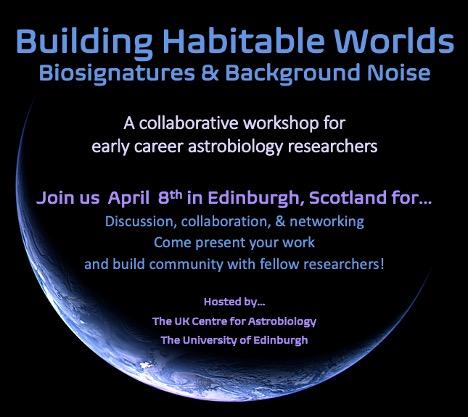
After a two-year break, Edinburgh has hosted the 2022 Building Habitable Worlds meeting, a chance for early career researchers in astrobiology to get together to discuss common research interests and collaborations.
Dr Sean McMahon gave an introductory talk on “Baselines, Biosignatures, and Bayesians: Anticipating Ambiguity in the Search for Life”. Attendees gave three-minute pitches on their area of research and then participated in open discussion to share their research and foster new collaborations. Discussions at this year’s meeting focused on the detection and interpretation of biosignatures and the non-biological background noise we observe in every system. Discussions continued at an informal dinner and at the pub later in the evening.
Thank you to Melanie Podbielski for organising this event and to all the participants.
UKCA contributes to Oxford Union Mars debate
February 2022
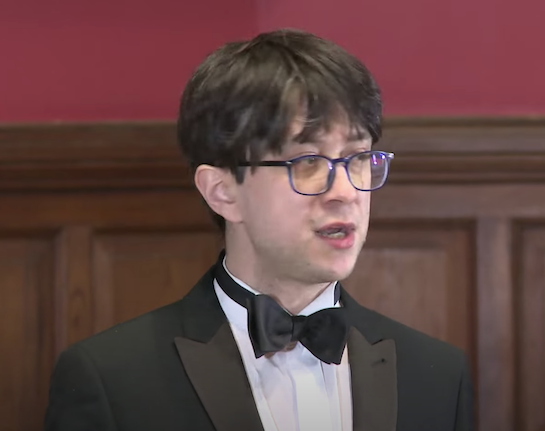
Dr Sean McMahon, co-director of the UK Centre for Astrobiology, was invited to speak in a debate on the motion "This House Would Populate Mars" at the Oxford Union, arguably the foremost debating society in the world. Dr McMahon opposed the motion for three reasons: the extreme unpleasantness of human life on Mars, the lack of any compelling need to settle other planets, and the obligation to preserve the aesthetic, cultural and scientific value of extraterrestrial environments. The motion was defeated. Also speaking in the debate were Dr Greg Autry of Arizona State University, Alfredo Munoz of the Space Architecture Technical Committee, Dr Sylvia Ekstrom of the Geneva Observatory, and the science journalist Dr Anjana Ahuja.
Dr McMahon's speech can be watched here: https://youtu.be/Rgex3NfloHU
UKCA PhD students celebrate conference success
September 2021
Several members of the UK Centre for Astrobiology participated in the recent meeting of the European Astrobiology Network Association (EANA), held online this year. Special congratulations go to our PhD students Annemiek Waajen and Ophelia Gunn for their prizewinning contributions. Annemiek gave a presentation entitled “How the presence of meteorites could have shaped microbial communities on early Earth”, which secured an EANA 20th Anniversary Presentation Award. Annemiek received a medal and certificate (sponsored by UNICAM SISTEMAS ANALÍTICOS). Ophelia won the 2021 Poster Award for her poster entitled “Fluid Inclusions in Ice: A Sanctuary for Martian Microbes?”, receiving a Springer book and an online subscription to the 2022 volume of Astrobiology.
Centre completes four-day meeting exploring conditions for freedom beyond Earth
June 2021
The Institutions of Extraterrestrial Liberty considered near and long-term forms of liberty in space and the governance and institutional arrangements to secure them. The Centre ran a successful 4-day online conference on 'The Institutions of Extraterrestrial Liberty' from June 8-11, 2021. The four days of talks can be accessed in the links below. The meeting explored the conditions for freedom beyond the Earth, from the near-term (satellite operations) to the long-term (ethics and freedoms on interstellar worldships). Over 35 speakers considered all aspects of different types of freedoms, exploring governance, conflict, war and institutional arrangements to secure different forms of liberty in space. Keynote talks were given by Anthony Pagden and Robert Zubrin. The meeting was supported by the Open Lunar Foundation, the Institute for Liberal Studies, the British Interplanetary Society, the Edinburgh Futures Institute, the UK Centre for Astrobiology. The Centre is now coordinating a book on 'The Institutions of Extraterrestrial Liberty' which will be published by Oxford University Press in 2022.
The talks can be watched here:
Day 1: https://www.youtube.com/watch?v=XA5OQK2NhzE
Day 2: https://www.youtube.com/watch?v=9u_Nq_gJZwQ
Day 3: https://www.youtube.com/watch?v=BcvJudni9jY
Day 4: https://www.youtube.com/watch?v=HYxRow1HvBI
New paper highlights risk that the search for life on Mars will find "dubiofossils"
Summer 2021
An international team led by Dr Sean McMahon has discovered enigmatic life-like microstructures formed in a Mars-like subsurface environment. Major NASA and ESA missions are underway to seek fossil evidence of life on Mars, and to return it to Earth. These missions are focused on finding traces of ancient microorganisms like bacteria, since more complex life is unlikely to have evolved on the red planet. Unfortunately, fossil microorganisms can be difficult to identify. Sean McMahon, Chancellor's Fellow in Astrobiology at the UKCA, has been searching for microbial fossils in rocks and minerals formed in ancient underground habitats on Earth, analogous to those that might be found on Mars. His search led him to NW Italy, where mineral veins that formed under the seafloor in the Jurassic are now exposed on land. The veins formed during "serpentinization", a chemical interaction between water and rocks that occurs widely in Earth's subsurface and has also taken place on Mars. Inside these veins, McMahon found thread-like microscopic objects that resemble fossil bacteria but could also have other, non-biological origins. Working with an international team of geoscientists and chemists, McMahon showed that these objects meet most of the "biogenicity criteria" used to identify genuine fossils, but can be closely mimicked by mineral precipitation in non-biological chemical reactions. The objects can therefore be described as "dubiofossils" — fossil-like objects whose true origins are difficult to determine. This finding highlights the risk that the search for fossils on Mars may give ambiguous results that must be interpreted cautiously. The paper has been published by the journal Geobiology and is free to read online at this link.
UKCA completes new prison materials for prisoners to imagine future beyond Earth
Summer 2021
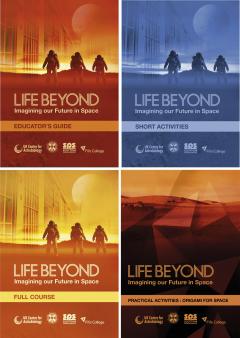
Collaboration with Scottish Prison Service, Fife College and Prisoners' Education Trust will allow all prisoners to take part in Life Beyond project
During the pandemic, members of UKCA were busy developing a new course for prisoners based on its highly successful Life Beyond initiative. The new materials allow any prisoner anywhere in the world to get involved in the design of space settlements.
Life Beyond has already led to Scottish prisoners publishing two books about designs for a Mars station and recently a book on prisoner designs for lunar stations with the British Interplanetary Society.
One limitation of this project has been the need for teachers to go to prisons to deliver it, which was not possible in the pandemic and takes up time and personnel in any normal time. Now, the UKCA has developed a stand alone set of materials that any prisoner can do on their own or with others. The materials come with an educator's guide to inform prison teachers about the course and how to implement it. There is a set of Short Activities that prisoners can do in an afternoon and a Full Course that takes two to three months. The materials take the participants through the design of a Mars or lunar settlement, getting them to write letters, draw designs, even to contribute to a Lunar and Martian Cookbook. All their work can be sent to Edinburgh for future publication.
You can read more about the Life Beyond project here and there is a summary here.
The new Life Beyond Course can be done by any prisoner anywhere and they can submit their work to the project, contributing directly to plans for the human exploration and settlement of space.
The materials have been developed in collaboration with the Scottish Prison Service and Fife College who deliver education in Scottish prisons. They will be distributed to English and Welsh prisons through the Prisoners' Education Trust. Any prisoner around the world is welcome to do the course.
If you are interested in accessing these materials, you can email Charles Cockell at c.s.cockell@ed.ac.uk
UKCA hosts three-day meeting on 'The Institutions of Extraterrestrial Liberty'
June 2021
In June this year, the UKCA hosted a meeting with partners, the Edinburgh Futures Institute, the Open Lunar Foundation (US) and the Institute for Liberal Studies (Canada), to explore the conditions for freedom beyond Earth. The establishment of a permanent human presence beyond the Earth raises questions on what freedoms people can expect. On the one hand, space offers escape from entrenched views on Earth. On the other hand, the control of oxygen, food, and water production in isolated populations presents opportunities for extensive forms of tyranny. Investigating the institutional arrangements for liberty in space constitutes a fascinating problem in political philosophy and one of the most profound new challenges for democracy in the 21st century. The meeting was run as a set of on-line webinars open to the general public. The speakers were all international experts on space law, science and political philosophy. The meeting was part of a wider effort by UKCA and agreement to publish a book in early 2022 on 'The Institutions of Extraterrestrial Liberty' with Oxford University Press (OUP).
UKCA launches BioAsteroid experiment to International Space Station
November 2020
We have begun a new experiment aboard the International Space Station to study the mining of asteroid materials, following the successful 2019 BioRock flight. In November this year, we will be flying our second experiment to the International Space Station. BioAsteroid follows our successful flight to the space station in August 2019 with Space X. In that experiment, we investigated the formation of biofilms on natural surfaces and the bioleaching of elements from basaltic rock.
In BioAsteroid, we will investigate the growth of bacteria and fungus on asteroidal material in microgravity, studying biofilm formation, bioleaching and other chemical and biological changes in microgravity, including the genetic transcriptional changes in space.
Second edition of Astrobiology: Understanding Life in the Universe
May 2020
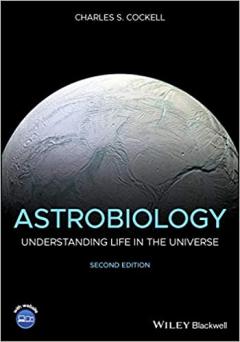
Wiley Blackwell has now published the second edition of Charles Cockell's undergraduate-level textbook: Astrobiology, Understanding Life in the Universe. The 23-chapter book covers all topics to do with life in the Universe, including the origin of life, early life on Earth, the co-evolution of life and Earth and the search for life beyond Earth, with chapters discussing the habitability of Mars, icy moons and exoplanets. The textbook is based on experience gained in teaching astrobiology to undergraduates at the University of Edinburgh since 2013.
The textbook is directed towards undergraduates in life sciences, physical sciences, geosciences and other fields, but it can be used by anyone with an interest in the subject. It contains 20% more material than the first edition, with new boxes on 'Discussion Points', careers of astrobiologists and review questions for each chapter.
The textbook comes with a complete set of lecture slides in Powerpoint covering all the chapters, which can be used to set up a new astrobiology course in any university. There is also a booklet with model answers to the 168 questions in the textbook. The resources can be found at www.wiley.com/go/cockell/astrobiology
The new textbook can be purchased on Amazon.
Astrobiology was written using experience from our University of Edinburgh course, taught since 2013, and it is written for anyone with an interest in this subject.
UKCA publishes new book on Moon exploration with Scottish prisoners
April 2020
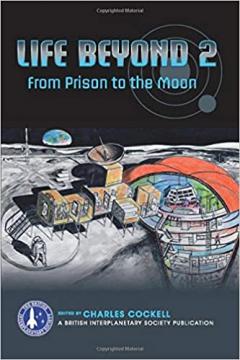
The Life Beyond project engages the prison population in the exploration and settlement of space. Since 2016, the UKCA has run a project in Scottish prisons to engage the incarcerated population in the design of settlements beyond the Earth. The programme is designed to enhance science learning, literary skills, civic responsibilities and other skills and abilities in the prison population.
The new book, published with the British Interplanetary Society, presents plans, engineering and artwork designs for the exploration of the Moon. Life Beyond is a collaboration with the Scottish Prison Service (SPS) and Fife College.
The book, Life Beyond: From Prison to the Moon, is the first long term strategy for the exploration of the Moon developed by prisoners.
The book follows the first book, published in 2018, presenting plans for the exploration of Mars. Life Beyond: From Prison to Mars, was the collected work of prisoners from HMP Edinburgh and HMP Glenochil. Proceeds from the sale of the books go towards space education projects at the British Interplanetary Society.
Life Beyond was designed to take prisoners beyond learning new information, to involve them in entirely original research and development of settlements beyond the Earth. From behind the confines of a prison, you can help direct humanity to the stars.
UKCA begins new 'Building Worlds' initiative
January 2020
The UKCA has begun a new initiative to consider how habitable worlds form and how life might leave traces on those worlds. The 'Building Worlds' research theme emerged from the 2019 Erskine Williamson day in the university's Centre for Science in Extreme Conditions (CSEC).
Building Worlds recognises that at the university we have a critical mass ranging from protoplanetary disc formation right the way through to the preservation of biomarkers of life and covering points in between (structure of the interior and atmospheres of planetary bodies, oigins of life, habitability of planetary environments), including links into the university's new Space and Satellite research theme which is focused on space, sustainability and the commercial market.
Building Worlds links researchers across the UKCA, CSEC, The Centre for Exoplanet Science and across diverse schools in the university. The principal objective is to build research collaborations leading to scientific productivity and new research proposals. In particular, it seeks to build new interdisciplinary research collaborations. The recent hiring of Rafal Szabla and Valentina Erastova in the School of Chemistry, who are establishing an origins of life focus at Edinburgh, and Colin Snodgrass in the Institute for Astronomy (comets and other planetary bodies) has brought new expertise to the university.

Astrobiology meets antibiotic therapy at Institute of Advanced Studies, Durham University
Project explores role of clays in life preservation
UKCA co-director and Chancellor’s Fellow, Sean McMahon, has accepted a three-month visiting fellowship at Durham University’s Institute of Advanced Study, a research centre that brings together leading researchers and practitioners from around the world to collaborate on cutting-edge interdisciplinary projects. Sean is participating in the “Antimicrobial Clay Therapy” project led by Durham molecular biologist Gary Sharples and sociologist Kim Jamie. This project aims to combine empirical studies of the chemistry and antibacterial activities of clay minerals with political, social and cultural investigations that may inform future medical applications of these minerals. Other visiting fellows on the project include leading international experts in clay mineral chemistry and activity.
Sean’s work on clay-organic interactions is motivated by their potential roles in the origin of life and the preservation of biomolecules and cells in ancient rocks on Earth and Mars. While in Durham, Sean is conducting biogeochemical experiments to investigate how and why some clay minerals modify the chemical environment around decaying organisms so that organic preservation is favoured. He will return to Edinburgh at the beginning of 2020.
UKCA to host MINAR 8 (Mine Analogue Research) at Boulby Mine in March 2020
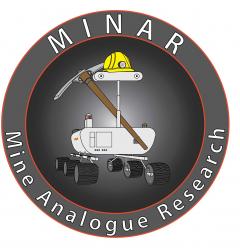
Planetary science and mining technology to be tested in Boulby Mine
In March 2020, the UKCA will host the eighth iteration of its highly successful MINAR (Mining Analogue Research) programme at Boulby Mine. MINAR 8 will involve teams from NASA JPL, Kalam University (India), Newcastle University and other institutions. MINAR 8 will focus on deep subsurface sulfate deposits.
Begun in 2014, MINAR brings planetary scientists together in the Boulby Mine to undertake scientific studies, test technology for planetary exploration and consider synergies with mining applications, using the Boulby Underground Science Facility.
You can read more about the MINAR programme and its past work in the link below:
UKCA successfully launches and retrieves first biomining experiment from space
Experiment studied microbial growth and biofilm formation in space.
The UKCA's BioRock experiment was successfully sent to the International Space Station in August 2019. The experiment studied how microbes grow, form biofilms and influence the extraction of elements from rocks.
BioRock was launched on SpaceX Commercial Resupply Mission 18 from NASA Kennedy Space Centre in July and returned at the end of August on the SpaceX Dragon capsule. The experiment investigated three microbes and their growth responses to microgravity, simulated Martian gravity and a 1 g control. The team conducted parrallel groudn experiments at NASA Ames Research Centre.
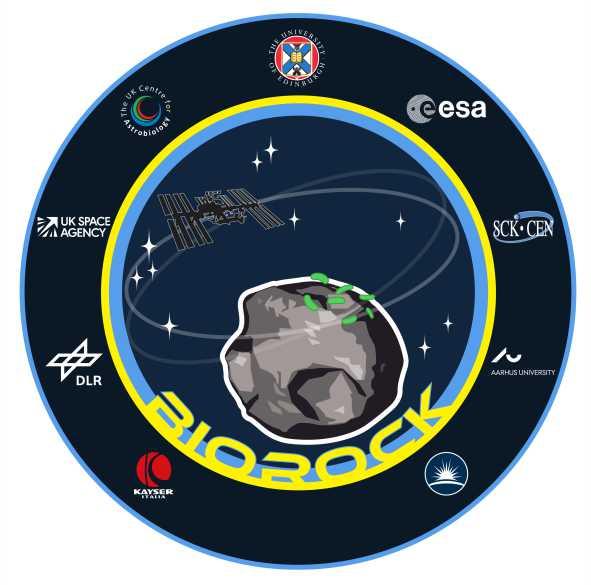
The experiment, as well as providing fundamental science results, was also the first biomining experiment to be launched into space and the hardware, the first mining experiment to be launched into space.
You can read more about this experiment here: https://www.nasa.gov/mission_pages/station/research/news/biorock-iss-research-microbes-space/
NASA selects UKCA experiment for Space Station research highlght
BioRock experiment to launch with Space X to ISS
The UKCA's BioRock experiment is a NASA research highlight in the run up to the launch of Space X's Commercial Resupply Mission 18 to the International Space Station. You can read more about the experiment here: https://www.nasa.gov/mission_pages/station/research/news/spx18-research/
BioRock is an experiment to study the interaction of microbes with rocks and the diverse applications of this research including: Biomining of elements from extraterrestrial materials in future human space exploration and settlement initiatives, the study of soil formation from rocks, the study of the use of extraterrestrial regolith in future space exploration. The experiment will also offer new fundamental insights into biofilm growth in space.
The project is led by UKCA at Edinburgh in collaboration with our scientific partners: the German Space Agency (DLR) and SCK-CEN (Belgium). The project is a collaboration with our prime contractor Kayser Italia through the European Space Agency (ESA).
UKCA prepares to launch the world's first biomining reactor into space
BioRock will test microbial growth and bioleaching on the International Space Station
The UKCA will launch an experiment to the International Space Station in July 2019 to test the world's first prototype biomining reactor. BioRock is scheduled for launch on Space X CRS-18 to the station. The experiment consists of 18 biomining reactors containing basalt rocks to simulate lunar and Martian rocks. Once onboard the space station, microbes on the rock are activated and they begin to grow on the rocks and extract economically interesting elements such as rare earth elements. The microbes will be grown in space conditions (microgravity) and simulated Martian and Earth gravity using the space station's KUBIK centrifuges. After three weeks, the experiment is terminated the reactors sent back to Earth on a Space X Dragon capsule. Scientists at UKCA will study microbial growth, extraction of elements from the rocks, and the role of microgravity and Martian gravity in influencing microbial growth.
The project is led by UKCA at Edinburgh in collaboration with our scientific partners: the German Space Agency (DLR) and SCK-CEN (Belgium). The project is a collaboration with our prime contractor Kayser Italia through the European Space Agency (ESA).
UKCA completes lunar station design with Scottish prisoners
In collaboration with the Scottish Prison Service, prisoners design their own lunar stations and publish a book
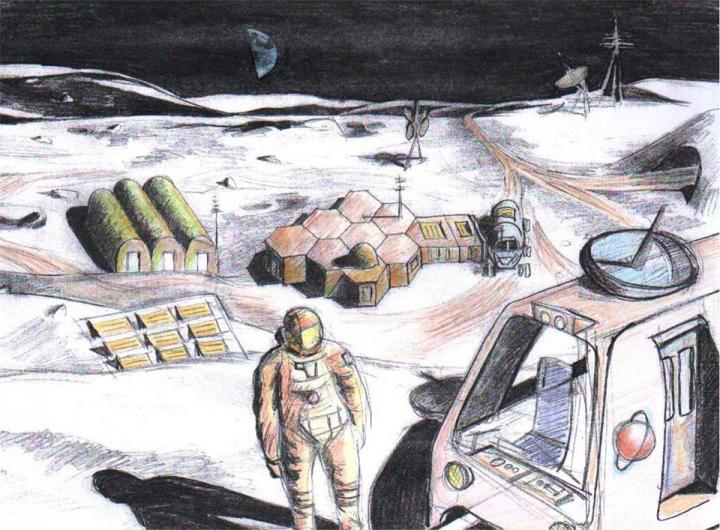
Following on from its successful first round of Life Beyond, a UKCA project to advance science education in prisoners and encourage prisoners to take an active part in original research, the UKCA has just completed a three month project in HMP Glenochil to design a station for the lunar surface.
Life Beyond has been running since 2016 and has already resulted in a prisoner-led book on Mars station designs in collaboration with the British Interplanetary Society. This time, prisoners took on the task of designing a station for the Moon (image shown of one of their drawings). As well as scientific designs, the participants wrote poetry, music, essays and considered the societal issues in establishing long-term settlements beyond the Earth, including governance and civil responsibilities. You can read more about this project and its learning objectives in the Journal of Correctional Education and in the summary paper below.
A book presenting the lunar station designs will be published later in 2019.
NASA programme BASALT publishes special issue on research for human Mars exploration
UKCA led microbiology effort on NASA analogue programme to prepare humans for Mars
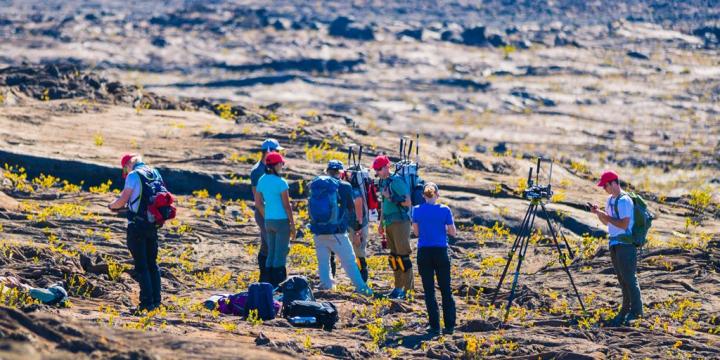
A special issue of papers has been published on the NASA project BASALT. Over a four year period, the UKCA worked as lead on the microbiology effort to study life in extreme basaltic environments in preparation for human missions to Mars. BASALT (Biologic Analog Science Associated with Lava Terrains) research programme was an international team of scientists, engineers, mission operators, and NASA astronauts dedicated to enabling the human-robotic exploration of Mars.
The four year NASA-funded programme explored the lava terrains of Idaho and Hawaii, testing technologies for humn exploration, sampling protocols and carrying out science. The UKCA led the study on the microbiology of the sites to advance sampling protocols and our fundamental understanding of life in extreme rocky environments.
The special issue (Astrobiology March issue) covers some of the major reserach outcomes of the BASALT programme.
UKCA completes seventh MINAR (Mine Analogue Research) at Boulby Mine, UK
Students from India join UKCA in tests of underground robots

The UKCA has led its seventh MINAR (Mine Analogue Research) programme in Boulby Mine, UK in collaboration with the Kalam University, India. Boulby Mine is the location of the world's first subsurface astrobiology lab, established by UKCA in 2013. In MINAR 7, UKCA and the Boulby Underground Science Facility were joined by six undergraduates from IMS Engineering College, Ghaziabad, India and the Dronacharya Group of institutions.
The students came to Boulby to test two rovers . The rovers are tests for technology for the Indian exploration of the Moon and Mars with possible transfer into mining environments. Over the week, they drove their rovers in the Boulby Mars yard, testing the components for ruggedness and improving ideas for rover design. This was the first field test of their rovers.
The students were selected through the Edinburgh University-Kalam Centre (India) project called 'Mars Mission India'. Mars Mission India is an initiative to advance astrobiology and space exploration education in India which has included developing astrobiology for primary and secondary schools in India and astrobiology engineering at university level, building on expertise developed by the UK Centre for Astrobiology.
The students returned to India to improve their rovers based on their experiences at Boulby and in the future they hope to work on Indian space missions.
MINAR is a UKCA-led initiative, begun in 2013, to link space exploration with the Earth-based challenges of safe and successful mining. It was the first planetary analogue programme to be started in the UK and the first analogue programme to be established in an active mine environment, linking a commercial environment with the development of space technology. You can read a paper on the MINAR programme below:
UKCA launches major new initiative in India
Mars Mission design and astrobiology takes off through Kalam University

The UKCA has signed an agreement with the Kalam Centre and the Abdul Kalam Technical University to launch an Indian nationwide competition to design technology for Mars. The 'Mars Mission India' will culminate in students visiting Boulby Mine to test their technological innovations. In addition to Mars Mission India, the UKCA and Kalam University are using the MOOC materials from the UKCA to launch an online astrobiology course in India.
UKCA Fellow publishes field guide to hunting for fossils on Mars
Where to search for life on Mars?
Publication proposes best places to search for life
Sean McMahon has recently published a paper that proposes the best places to search for evidence of past life on Mars. The paper was written with a host of co-authors from the NASA Astrobiology Institute, and aims to help forthcoming NASA and European missions to search for traces of ancient life on the red planet. Three or four billion years ago, Mars was warm enough to sustain lakes, rivers, and maybe oceans. These water bodies produced sediments rich in iron, silica, and clay — components strongly favourable to the formation of fossils, for reasons that are well understood and experimentally verifiable. On Earth, rocks this old have been scrambled, destroyed and recycled by the movements of tectonic plates and by the erosive action of liquid water. But on Mars, a much drier and less dynamic planet, rocks of this age are well preserved and easy to find in crater-lake and river deposits. Right now, we argue, these rocks are the best place to look for fossils on Mars — better than the other candidates, which include possible hot-spring silica “sinter” in Gusev Crater, rare carbonate minerals, salt deposits, and mineral-filled pores in volcanic rocks (these might be explored one day, but need more work to resolve critical uncertainties and objections).
You can download the paper here.
UKCA - The First Five Years
Paper summarises achievements and lessons from first five years
The UKCA has published a paper summarising the first five years of the centre with a specific focus on lessons we have learned in establishing a centre. The paper is primarily directed at those thinking of doing something similar (or setting up any centre). It discusses how we have integrated science with teaching and public education and our accomplishments in science, technology and space policy. The paper is open access and you can get access to it by clicking here. Or you can download it below.
UKCA publishes new book on prison Mars station designs
Publication showcases Life Beyond work
After a successful first set of courses at two prisons in Scotland, HMP Glenochil and Edinburgh, a book bringing together the Mars station designs developed by learners at the prisons is to be published jointly with the British Interplanetary Society. The book - 'Life Beyond - From Prison to Mars' will be distributed to space agencies, engineering organisations and space societies around the world to promote the work at the prisons. It's also to be used as a 'textbook' for future iterations of the course at other prisons. If you're interested in receiving a copy of the book, please get in contact with us.
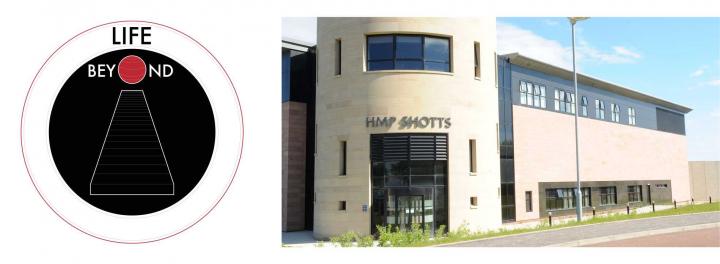
UKCA completes MINAR 5, 1 km underground
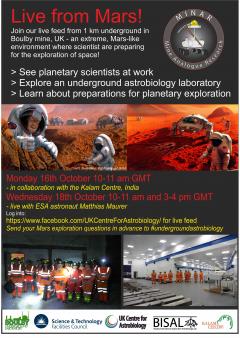
Fifth astrobiology analog campaign using its deep subsurface astrobiology laboratory
The UKCA completed a two week campaign of testing space instruments and studying life in extreme environments using an underground astrobiology laboratory 1 km underground at the Boulby Mine, UK in October 2017.
MINAR 5 (Mine Analog Research) ran from October 8-20th 2017 for two weeks and involved scientists from NASA, Sweden, Switzerland and a number of groups from the UK. It focussed on the study of life and biosignature in the deep subsurface and the testing of a variety of instruments including drills, life detection equipment and other new planetary instruments. In the second week, MINAR involved ESA astronaut Matthias Maurer. You can access conversations on Matthias here and You Tube also has other links to MINAR.
You can read about the MINAR programme here.
UKCA joined by Javier Martin-Torres
In September 2017 the UKCA was joined by Javier Martin-Torres, who currently leads a planetary science and atmospheric research group at the Luleå University of Technology, Sweden, division of Space technology. Javier is PI of the HABIT instrument to be flown on the ExoMars European Mars lander and will join us as a Visiting Fellow.
New Marie-Curie Fellow to join UKCA
The UKCA was joined by by Marie-Curie Fellow, Sean McMahon in September 2017. His work has focused on early life on Earth and its application to looking at the habitability of other planets such as Mars. Previously at Yale and Aberdeen, at the University of Edinburgh he will work on subsurface biosignatures and how they can inform the search for life elsewhere.
New NSF Fellow to join UKCA
The UKCA was joined by Rebecca Prescott. Currently at the University of Hawaii, her NSF (National Science Foundation) Fellowship will be held jointly at the University of Edinburgh and the University of South Carolina. She will be focusing on quorum sensing molecules in microbial mats and the search for biosignatures on Mars.


